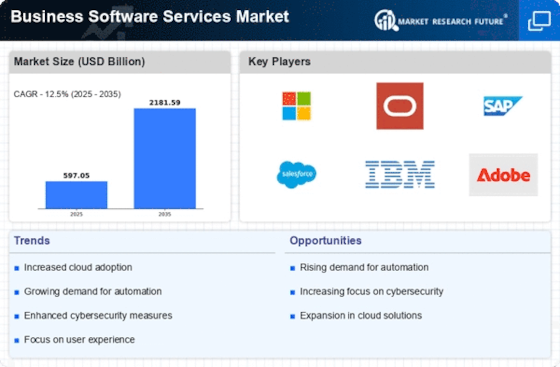Market Trends
Key Emerging Trends in the Business Software Services Market
The market trends of the business software services market are indicative of the ongoing digital transformation and the evolving needs of businesses across various industries. Business software services encompass a wide range of solutions, including enterprise resource planning (ERP), customer relationship management (CRM), human capital management (HCM), and collaboration tools, among othersThese market regulatory shifts spotlight the growing need for agile, scalable and end-to-end integrated software solutions that allow businesses to optimize their processes, improve customer satisfaction and innovate within a dynamic business environment.
An important trend evolving in the business software services market is cloud-based solutions. More and more organizations are moving away from legacy on-premises software in favor of cloud platforms that provide improved flexibility, scalability, and cost effectiveness. This trend is pushing the creation of cloud-native business software services which are flexible, integrates easily with other cloud systems and can be accessed remotely by remote or distributed workforces as well as accommodate changing requirements of modern businesses.
The other notable development influencing the business software services market is industry-specific and vertical solutions. Looking for ways to streamline operations and create specialized customer experiences, firms are demanding new business software services tailored toward specific industries like health care, retailing manufacturing and financials. This movement causes specialized software suites and modules that address industry-specific processes, compliance standards, and best practices such as to help companies become more efficient in their operations resulting into competitive differentiation.
Moreover, the AI and ML capabilities that are increasingly becoming integrated within business software applications create certain trends in this market. Companies are using AI and ML to replace manual menial tasks, use predictive analytics & personalize every touch point with the customers. This is fuelling the inclusion of AI-driven features, including chatbots, predictive analytics and recommendation engines into business software services that allow organizations to streamline their processes, make better decisions but also deliver more satisfying experiences.
Additionally, there is a growing demand for integrated collaboration and communication tools aimed at enabling remote work and virtual collaboration in the business software services market. With emerging unified work environments, businesses require all-in-one software solutions that integrate project management tools with team collaboration features and also include video conferencing services as well as document sharing. This trend is leading to the creation of unified collaboration platforms that allow for integrated communication, information sharing and task management, enabling organizations to adjust with working nature-in favoring a digital early world. Moreover, the emergence of low-code and no-code development platforms is influencing the business software services market. Businesses are increasingly looking for ways to accelerate the development and customization of software applications without heavy reliance on traditional coding skills. This trend is driving the adoption of low-code and no-code tools that enable business users to create, modify, and deploy software solutions with minimal coding requirements, thus empowering organizations to innovate more rapidly and address specific business needs without extensive IT involvement.


















Leave a Comment